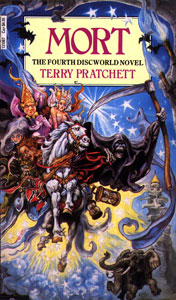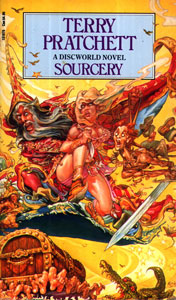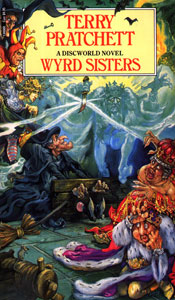
That's the tag-line on the back cover of my copy of the fourth Discworld novel, Mort. And it instantly tells you why this, out of all the books, is the one Hollywood has been chasing for years. There can't be many better one line pitches.
Sadly, all sorts of wacky legal issues and stock Hollywood executive incompetence (of the sort you expect they do on purpose so that frustrated writers have something to talk about, the famous comment in relation to Mort was “Can we lose the Death angle?”) means not only has it not happened, it's unlikely ever to see the light of day. At least not whilst Pratchett is alive and able to object, I suspect once he's passed on it will all go Douglas Adams and we'll have a mediocre film backed up with “No, really, Terry would have loved it” comments from those involved.
It's the details that make the book work. The opening scenes of Death hiring Mort, and then taking him to Ankh-Morpork for a take away (I DON'T KNOW ABOUT YOU BUT I COULD MURDER A CURRY), are evocative, funny, sad (Death's reaction to some drowned kittens) and frequently all three at once, such as the wonderful mental image created when Death lights up a pipe, complete with smoke coming out of every socket.
There's also some nice thematic stuff, we get some early gags about the speed of succession amongst monarchs that becomes more than throwaway as Mort fights to make sure the Princess lives long enough to be crowned. And the mirroring of Death exploring more and more of the human world (winding up working as a night café chef) as Mort becomes more and more distant is expertly done.
As the first Death book, we get a lot of embellishment of the character and his set up. His house, daughter and horse all briefly featured in The Light Fantastic, but here Ysabell is fleshed out to the point where she's almost a completely different character, Blinky gets his rather wonderful name and we fully explore the sinister environs of the monochrome cottage that's bigger on the inside. We also meet Death's manservant Albert for the first time. The founder of Unseen University, he's over 2000 years old, tried to cheat Death but wound up working for him. The contrast of this very working class mockney with his straight man master is perfectly handled. We also get something that won't really be touched on again, as Albert briefly returns to the world and actually tries to destroy Death at one point (a small cameo from Rincewind undoes him), in future appearances he'll be much more subservient.
If there's one flaw, it's Mort himself, we don't really get into his head as we would with other Pratchett antagonists, and he's so distant from the off it's hard to set up the contrast with his Death persona later on. He and Ysabell also spend so long saying they'll never get together that you'd be more surprised if they didn't.
However, the final confrontation between Mort and Death more than makes up for this. Especially in relation to later books. Considering Pratchett isn't a continuity bothered author the fact this scene works perfectly in the context of its later being revisited during Soul Music is not only amazing, it even reads as if it was planned all along. A very special book that effectively relaunches the series as a much more interesting, intelligent and indeed funnier series.

It's certainly the first book to feel done by the numbers. There's another threat from the Dungeon Dimensions (for the third time in five books), another Conan send up (for the third time in five books. We actually get two with Conina and Nigel the Destroyer basically sharing the same gag), Rincewind being forced into working to save the world against his better instincts by an ancient magical artefact (the Archchancellor's Hat filling the same role as the 8th Spell in the first two books), a young boy as the conduit for the evil (as in Equal Rites), a psychotic wizard's staff (also Equal Rites) and incompetent Wizard's winding up on the side of the villain almost by default (as in The Light Fantastic). And that's just the really overt ones.
I do find it hard to hate though, the rather splendid unabridged audio book, read with great gusto by Nigel Planer, was a birthday present around the time of me first getting into the books, and that leaves a great deal of residual fondness.
The plot itself is also quite good and nicely epic, with a Sourcerer (the 8th son of an 8th son of an 8th son, this whole Wizard obsession with 8 would pretty much fade after this) coming to the Unseen University and galvanizing the complacent wizards into taking over the world. The problem is twofold. Firstly, the books have evolved but Rincewind hasn't. He's still stuck in the same default run away from everything mode with no subtlety. The book also has exactly the same “Rincewind makes a stand” ending as The Light Fantastic, something that will be also be ignored by subsequent books (and indeed, virtually all his showings have him deciding to make a stand for the first time in his life over and over again).
Secondly, and this is a retroactive one, it's almost too early for a disaster at Unseen University book. Five or six novels later, when Ridcully and the other faculty members had been firmly established, it would have a lot more impact. Here it's a bunch of fairly generic nobodies you'll struggle to remember once the book is over. The Librarian is pretty much the only character in the whole book to walk away with any dignity, and you can tell why it would be a very long time before the books cliffhanger with Rincewind lost in the Dungeon Dimensions would be picked up by one of the main books (though we'll have a little novella to tide us over in the meantime).

As I said about Equal Rites, the Witch books have never really been huge favourites of mine, which in Pratchett circles is like saying you enjoy hammering nails into your testicles. So, allowing for my personal bias, this is a capable book that's at least better structured and has some more gags in it than Sourcery.
King Verence of Lance is murdered by his evil cousin Duke Felmet and becomes a ghost haunting the castle. His son winds up in the hands of the three witches, who see the boy is adopted into a theatrical family, whilst the mad Duke and his domineering wife slowly start to run the kingdom into the ground. The players, and more particularly writer Hwel, means the already thinly disguised Shakespeare send up is really hammered heavily over the head of the reader.
The problem I have with the Witch books in general is, Weatherwax is just too damned powerful. She's frequently scarier than the baddies (frankly you don't think the Duke has a chance) and doesn't have any of the more endearing character flaws that will make Vimes such a wonderful character in the Watch books. It also makes the arguments between her and the other witches seem a tad pointless as you know she'll turn out to be right no mater what. Magrat in particular is just there to look a bit useless and stupid in comparison. Though she at least gets some nice stuff with the Castle's Fool who winds up her love interest (and- SPOILER ALERT- becomes King. Not much of a spoiler though as you'll likely have it worked out by the third variant of the “Only a fool would want to be king” gag in the first half).
The book's highlight is a wonderfully moody sequence of the three witches working together to fly round the kingdom before dawn so they can move all of it 15 years into the future so that Verence's son will be old enough to come back and reclaim the throne (SPOILER ALERT- He turns it down).
The books climax, where the players return to put on a play commissioned by the Duke to tell the “truth” of the King's death does the job, but I find it very hard to engage with. The Richard III gag is adequately done, but the message that words have power is so obvious that it just winds up feeling twee.
These three books only really contain one essential read in Mort, though I know that's a crazy minority opinion and most fans would count Wyrd Sisters as well. However, the sharp increase in quality since The Colour of Magic is still impressive and, after one slightly strange book, we'll be into the really good stuff with the arrival of Sam Vimes. Who is not only the best of all Pratchett's characters, but marks the start of the real golden age of the series.
 RSS Feed
RSS Feed
